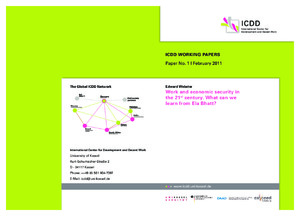Work and economic security in the 21st century
| dc.date.accessioned | 2015-02-25T10:22:27Z | |
| dc.date.available | 2015-02-25T10:22:27Z | |
| dc.date.issued | 2011-02 | |
| dc.identifier.uri | urn:nbn:de:hebis:34-2015022547508 | |
| dc.identifier.uri | http://hdl.handle.net/123456789/2015022547508 | |
| dc.language.iso | eng | |
| dc.publisher | ICDD, International Center for Development and Decent Work, University of Kassel | eng |
| dc.rights | Urheberrechtlich geschützt | |
| dc.rights.uri | https://rightsstatements.org/page/InC/1.0/ | |
| dc.subject.ddc | 320 | |
| dc.title | Work and economic security in the 21st century | eng |
| dc.type | Working paper | |
| dcterms.abstract | In recent decades there has been a transformation of two central concepts of modernity – labour and the household. Ela Bhatt – the founder of the Self-Employed Women’s Association of India (SEWA), has made an important contribution to this transformation. Through the emergence of unions such as SEWA, the notion of who represents labour is being broadened; the marginalised are finding an institutional voice. Increasingly, the household is being recognised as a site of both production and reproduction. SEWA is not a traditional trade union that aims, through collective bargaining with an employer, to improve its members’ wages and working conditions as sellers of their labour power. Instead, it aims to empower women economically in the informal economy by bringing them into the mainstream economy as owners of their labour. The union dimension of SEWA builds their collective power through struggle; the cooperative dimension translates their bargaining power into the economic and social development of its members and their community. Besides, Bhatt’s approach to the self-employed was a direct challenge to the ILO’s tripartism when it was established in the early seventies. The first part of the paper provides a short biography of Ela Bhatt, describes the origins of SEWA, analyses a ‘classification struggle’ over how and who is to define what a worker is. In the second part the author considers SEWAs innovative organizing strategy and is rethinking modernity in the labour context. In the conclusion the paper discusses the lessons that can be learnt from Ela Bhatt. | eng |
| dcterms.accessRights | open access | |
| dcterms.alternative | What can we learn from Ela Bhatt? | eng |
| dcterms.creator | Webster, Edward | |
| dcterms.isPartOf | ICDD Working Papers ;; No. 1 | eng |
| dcterms.source.series | ICDD Working Papers | |
| dcterms.source.volume | No. 1 |
Dateien zu dieser Ressource
Das Dokument erscheint in:
-
Publikationen [28]

